By MOWOSO (translated by Dominique Malaquais)
GROUND / OVERGROUND / UNDERGROUND is a project of the Congolese trans-disciplinary collective Mowoso. Its first showing took place in November 2010 at Afropolis, an exhibition on African cities curated by Christian Hanussek and Kerstin Pinther.
Ground / Overground / Underground is a project built in, around and through a range of different space- and time-states that exist as both separate and conjoined entities – as blocks that can be assembled and disassembled at will. The project allows Mowoso to experiment within an open system of networked creation: to develop work and research processes that result in multiple forms, each and all of which can be presented in different place- and time-scapes.
The starting point of the project is a series of videos, sound recordings and photographs made in 2009–2010 in three places:
− In Mbandaka (DRC), over the course of a six week SPARCK residency. The city of Mbandaka stands astride the Equator, directly below one of the single most important loci anywhere in our globalised 21st century world: the Geostationary Earth Orbit, which hosts a majority of the planet’s communications satellites;
− In Kinshasa, the capital of DRC; and
− In Mikili: a hybrid, mythic ‘third space’ located in Western Europe.
Drawing on the materials collected and created in these places, Mowoso is building a polysemic, Afrofuturistic video performance / installation.
Melding fiction and faction, Ground / Overground / Underground tells the story of a very particular journey: the psychic path that a man must travel to make his way from the continent he calls home – Africa – to the West, the nucleus of 21st century digital globalisation.
The images and sounds at the heart of the project evoke dreamtime itineraries, all leading to Mikili, a place, a state of being and a state of mind that many young people in Congo hope against all hope to reach, because there, they imagine, they will find solace (comfort, means, luxury) to replace the violence visited on their land over the past 150 years.
In the world of Ground / Overground / Underground, hybrid identities rub up against and collide with one another in a postcolonial universe. Performances are filmed by Mowoso founding members Dicoco Boketshu and Eléonore Hellio: peculiar, poetic works ‘starring’ Boketshu, musician and artist Bebson Elemba (aka Bebson de la rue), Wemba (one of Congo’s most famous wrestlers), performance artist Antoine Mofilinga and others. Objects, images and sounds appear and disappear, moving in and out of a post-industrial ‘machine’.
Developed in partnership with activist architect Julien Beller, the Ground / Overground / Underground space machine toes multiple, intersecting lines spanning the universes of sci fi, DYI, time travel, pulp fiction and radical ethnography. Bearing witness to the sheer avalanche of electronic technology overtaking our world, it calls attention to the devastation wrought in Congo by the ‘First World’s’ mad rush for coltan, a precious metal essential to the production of cell phones, satellites and missiles. Eighty-five per cent of the planet’s coltan reserves are located in DRC, Ground / Overground / Underground reminds us, and because money is worth more than lives, millions have died there in wars fuelled by global capitalist greed.
Excerpt #1
Words by Eléonore Hellio and Dicoco Boketshu

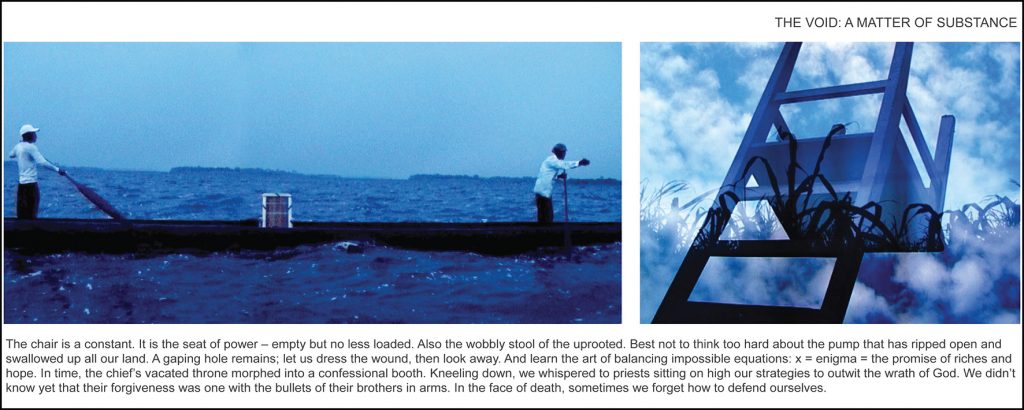
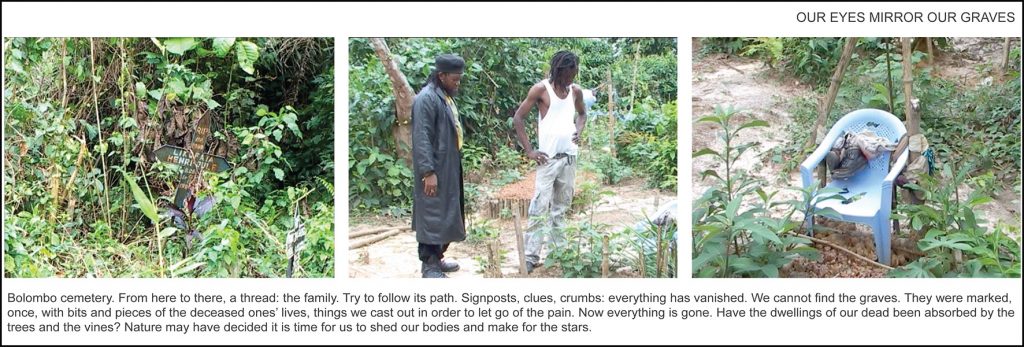
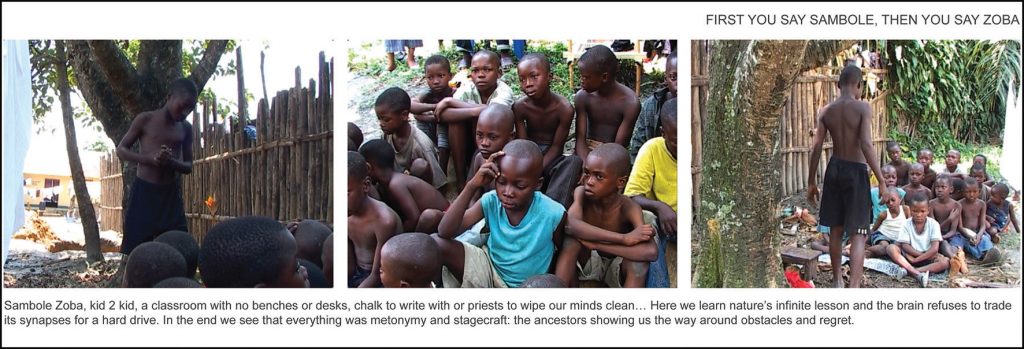

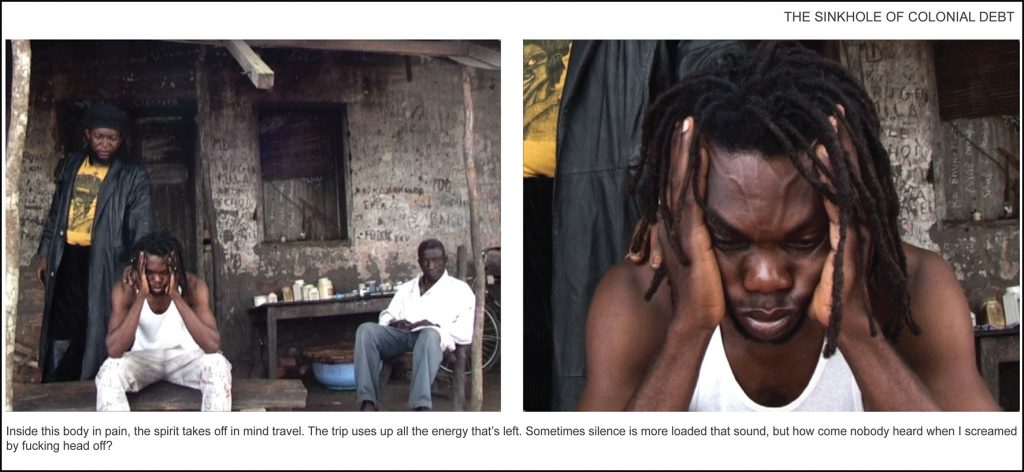
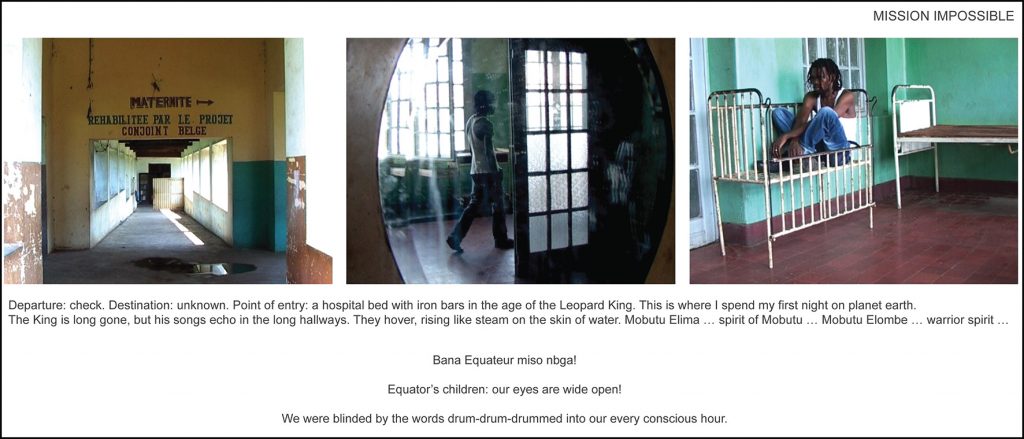
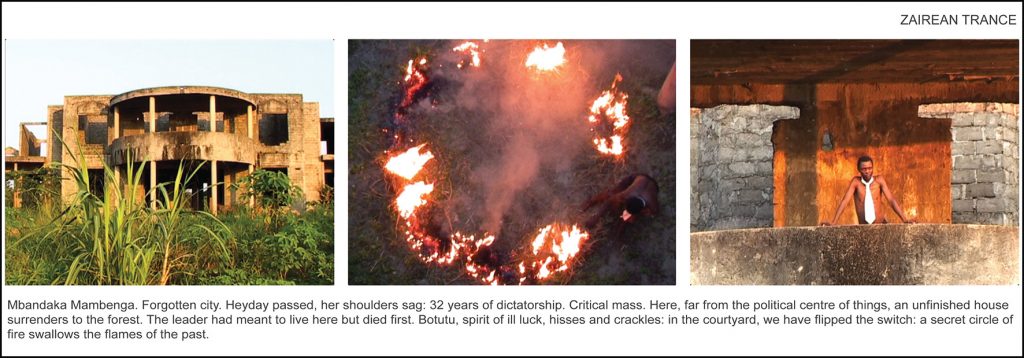
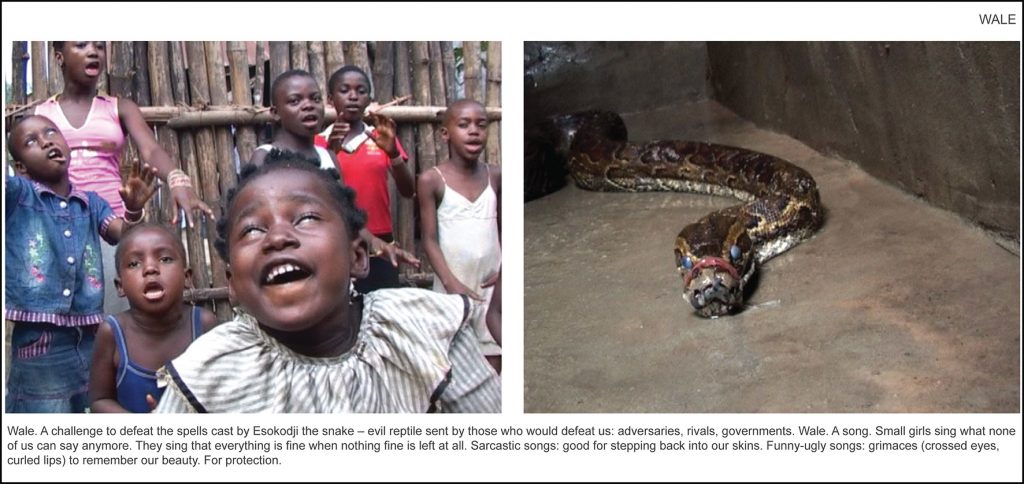
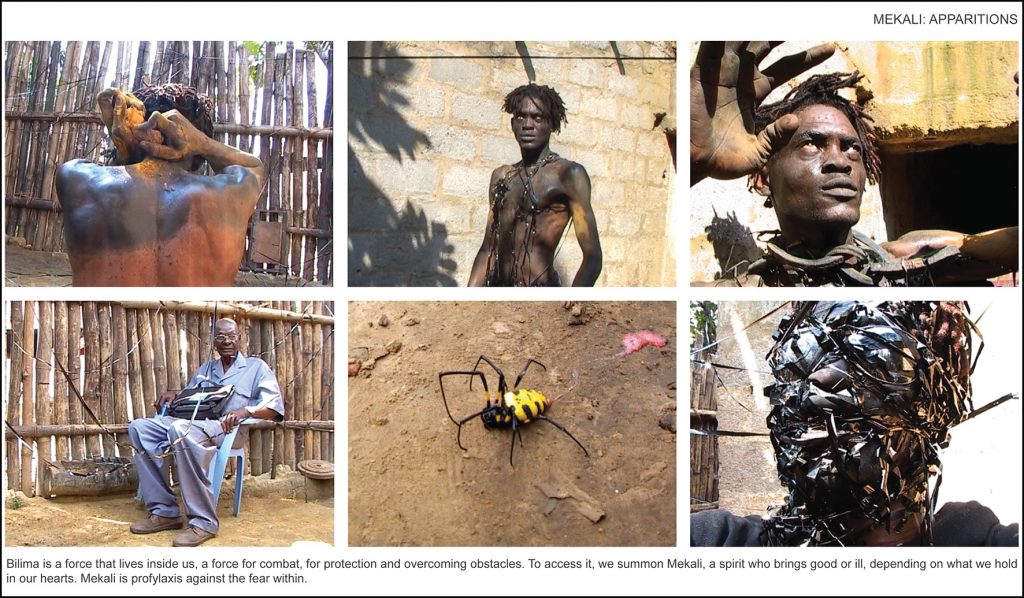

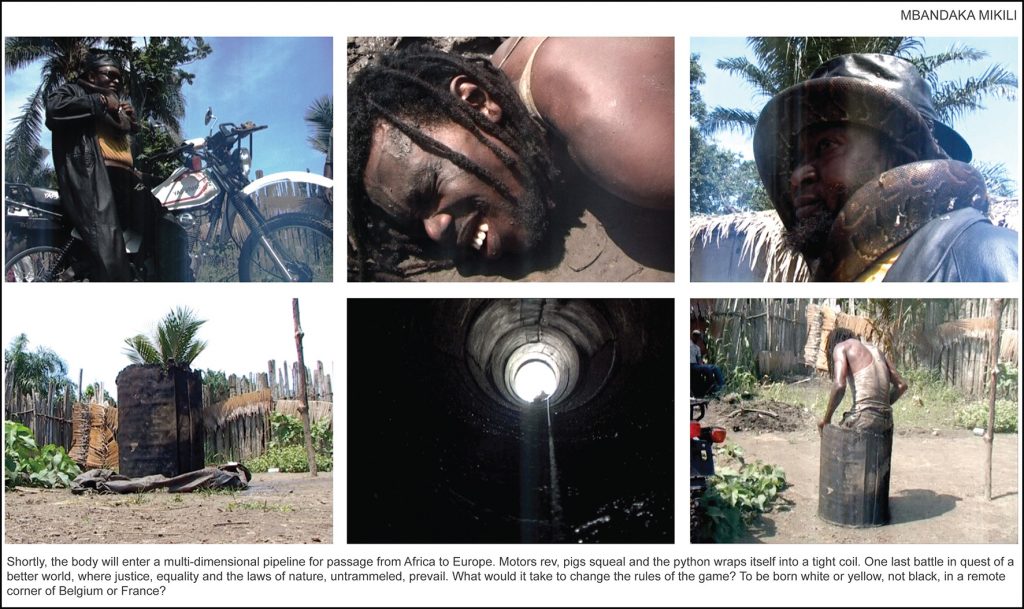
Excerpt #2
Words by Eléonore Hellio
Kinshasa, DRC.
Again, fits and starts; further negotiations;
flip-flop back and forth blabla from the paper pushers. Born here?
Won’t change a thing: if you want to leave this city, go to another province,
you need an exit visa. The war is inside us now. Under our skin.
Kin-ky. Desire moves in transit zones of current and sound, fluctuating,
flitting across urban scape. Live wires link intention and act. Or not.
This day, every day, in the capital city, battle lines are drawn to retain dreams,
forestalling the loss of illusion.
We’re out. And here, finally. Mbandaka! Sun @ zenith, sidereal revolution,
nadir @ antipode. The Equator runs smack through the heart of the city.
Ancient astronomers knew about it; a boulder marks its presence now,
a geo-myhtic rockpile, painted mustard yellow by a telcom company.
In the one spot further than all the others from the planet’s centre of gravity,
neither in the North nor in the South, on the very axis of the tree of life,
we slipslide through infinite variations of the universal.
We take off – it’s mind travel, now – in an incandescent flux of queries:
psychic thickness vibration. The ghettobound of this world have learned to live
outside the stretches of time, but that doesn’t do much for the colour of the sky.
Conduct an autopsy on history’s corpse (there will be no derogations).
Sift understanding from the ruin of its limbs. Put to use the anger.
See clearer in the face of what’s been inherited – pretty ditties for murder
and highly specialised information deeded by those who passed through this place before us.
At what point, exactly, do we give up, knee deep in the shards of it all?
QUIET! Camera’s rolling, but the film isn’t done.
The official and his officious double are whisked away in a jeep.
A test: take dictation now! Everybody’s scribbling away;
unless you’ve got an officer in the family, though, you’re wasting your time:
they’ll forget to collect your papers. Everything’s gone fractal.
For now, at least, the middle way is the only way for me. Consent. Assimilate.
Mundele me; too visible.
Coming as I do, in the wake of centuries of beatings and deaths meted out by tyrants,
so many shaded my colour of pale, how could I not stand out? And so, silence.
Silence will be my key, opening onto a space where, possibly, a life might be built,
working thorugh Fanon in the absence of Fanon, and with no words. I didn’t expect this.
The sheer violence of it. Eventually, there will be utterances – once the wave has receded,
made its way into the depths of the river. Once it has gone and come back
to sweep the autopsy table and its theatre of operations clean.
Sadness – sadness like these – will not be tamed.
I am out of body even as the body goes about its everyday moves.
I listen to whispers swishing through the motorless city. For consolation.
I’m not waiting for anything anymore; a good place to be, really;
all that’s left is breath. Mbandaka! Intimate archaeology. Our limbs do the talking.
For rhythm, the scansion of Kimongo verbs. Sounds captivate me. I understand nothing.
And so I listen. Someday, maybe, I’ll learn the language. And die here, to no particular end.
Excerpt #3
Words by Eléonore Hellio
[Online directions: Take a walk along the avenues of Mbandaka.
Depart from the centre of town, planned by European architects working for 19th century Belgian monarchs.
Observe the houses: ageing but held together nicely with a clever mix of unexpected materials and objects.
Walk away from the centre. Local building forms gradually take over. Separations between streets, yards
and living quarters begin to fall away. City dwellers re-appropriate their environment. Tranquility takes over.
Urban space no longer stands in antagonism to other kinds of spaces.]
Swarms of butterflies, clouds and clouds of them now. We trail them down the long earth streets.
In silence. Follow their movement: for now, for us, they will be dreams, memories, free
(for an instant, only, but free) of the crisis we carry.
I don’t remember asking the pharmacist’s grand-daughter to catch a butterfly for me.
But she’s gone ahead and trapped one. She brings it to me: lipalala, lipalala, a live lipalala.
Lost to the sky, it doesn’t try to escape, let’s us pass it from hand to hand, as each of us looks at it up close,
pressing its wings hard between index and thumb. From the lipalala’s tiny body, a shower of powdery scales:
each set of fingers adds to the damage. Still, small suction as the lipalala seeks a foothold. In the end, it stops.
And comes to a standstill on Bokungu’s forehead.
Bokungu: mothman suspended before the shutter-click of my camera.
I peer through the viewfinder with sweat-drenched eyes.
[Online dictionary: Mothman – peculiar creature encountered in several countries, seconds before a catastrophe.
And after occasionally: in between the twin towers, for example, as they began their tumble to the Manhattan
pavement on September 11th 2001. An inspiration, possibly, for the notion of the butterfly effect:
a butterfly twitches its wings; the movement goes wholly unnoticed, yet sets in motion events leading to a
cataclysm. Or its contrary (averts disaster). Offspring of Little Boy, the bomb dropped on Hiroshima, made lethal
with uranium mined in Belgian Congo]
Bokungu: mothman or lipalala, identity in question, image exposed.
How many shots would it take to make a portrait, one single picture, wide enough to bridge these many rivers?
Have I been online too long, lost myself to hyperlink labyrinths, or is it the opposite?
Am I reconnecting with something elemental, the fundamentals of an experimental metaphysics?
My thoughts turn to the wing twitches of our postcolonial now, to analog mounds of digital magma,
to the impact of their invasive/evasive convulsions. I become the spontaneous entomologist of my own
thought process, in a space where nothing at all feels anchored anymore, save the immense, magnificent
void at whose heart we meet in this city astride the Equator. The butterfly-man of Mbandaka cannot be a
mere presage; this much is clear. Everything we wanted to know of history we’ve learned already. If we loose
our grip, it’s because we choose to: we retain first right of refusal. Butterfly trapping has a long history here –
centuries old. Butterfly collecting too. European kings were fervent adepts. For them, thousands of specimens
were gathered, some very rare. Delicately, each insect was pinned to a pretty backing and set aside for further
contemplation. In storage rooms, boxes, drawers, curio cabinets and famed museums.
The story’s much the same Mikili-way: sense is made of the world by skewering life, pinning it down, forests
and tress left behind, appropriating everything in a frenzy of collection powered by too much information
and too little thought.
In Mbandaka, people remember how fascinated the missionaries, the functionaries and other expatriates
were with local butterflies. No: Bokungu is not wholly a mothman. When his dreads come out, antennas
to the world, Rasta prophecies rule: some lions cloak themselves in butterfly garb, the better to prowl the land.
No coincidence, then, his passage, now, through other streets half a world away; Mbandaka behind him,
Paris (Belleville, to be precise) for the foreseeable future. On the streets he shifts shape, métisse
extraordinaire, part bullwhip, part Babylon anthropocene.
Excerpt #4
Words by Dicoco Boketshu
I.
Through and invisible door
This voyage
Imaginary (imagined?)
Mikili:
So powerful a pull
Demanding sacrifice. And a death.
For paradise here we will risk a life there.
Because we believed in them. Believed when
they said the sky was Technicolour blue, here,
and the houses too.
In Belleville.
Belle ville.
Pretty city.
An answer, or half a reality: part for the whole
of dreams we have always already shared.
Since childhood.
And so now, life’s latest phase.
Behind me: conflicts/ wars/ envies/ all of those
whom I left there, tethered to a single grid of pain.
Life lived in hope and fear that someone,
just one man, will gather wings enough to go.
To Belleville.
Belle ville.
Pretty city.
No false moves are allowed.
None, if I am to make real a dream I have
always already lost.
Here, I have become a bridge back there.
Forbidden to break. For a family left behind.
The earth has taken a tentative step.
And has found she’s home to beings
who don’t give a crap.
Who crap on her.
And step on others, building staircases of flesh.
One man does what another man did to him;
it’s the order of things. The world changes
and changes, too fast.
Evil lives everywhere, and everywhere everyone
wants to be quoted: call my name/my name first.
Because we do not know yet who we are.
Everybody’s looking everywhere.
Some make history, make it up as they go.
To feel up, and high. Higher, highest.
To live in France.
Metropolis.
Metro police.
In Belleville.
The voyager – I– is a stranger in the pretty city,
but that’s not all.
This is not his first voyage.
It is his second: a voyage of the mind –
imaginary travel begun even as a first trip is underway.
In quest, always, of the real reason for our attachment.
Our attachment to a fake.
To pretty pretty stories, fake through and through.
II.
The butterfly and I.
We belong to different species.
It’s difference in a good way.
Still, we are both voyaging spirits: sight of us prophecies a visit.
We fly low, past seas of beetles beating the earth’s crust
And consider coming to a rest.
Landing.
Falling.
And proceeding.
Breathing, because somehow we must cease feeling
the strangeness of who we are.
I doubt those who live in Belleville know their luck;
they (too) could have landed elsewhere.
The butterfly.
And I.
Fallen.
The departure is imaginary, the arrival not. These kinds of
realities you hold onto hard. Belleville/ Belle Ville/ pretty city;
it’s everybody’s talking about.
Itinerary:
- Home town: Bonkena, today Mbandaka, Equator province
(centre of the world) - Congo River: on the water, grandly, all the way.
- Capital city: Kinshasa/ Kin la Belle/ belle belle ville.
So many days, so many documents, so many hours and days
and months waiting to be chosen, elected to move, shuffled,
like so many papers
- Kinshasa to paris: Kin la Belle to belle Ville.
8000km, but in transit no one gives it a thought:
the only thing you want to know is is if the sky there really is
Technicolour Blue.
So much time spent dressing up the dream:
most who make it are disappointed.
But the real problem, the nut of it, is this. To fit in. To find a fit.
Any fit.
How to (take 1): in Belleville, shall I copy everything?
- Mbandaka to Belleville. This is how it is for me:
a pipe, a tube, a piece of pipeline just wide enough for one
man’s body; you crawl in one side and come out on the other.
What memories you have, you store. A memory card will do.
Or a flash drive.
Crawl out and, this side, never once stop thinking.
You may be the last man on earth.
How will you know where and when and how to jump?
One friend bridges the here and the there, the four corners of
my earth, and my right, my one right, to the city: www.
I dream in Internet.
Everybody here is passing through.
Belleville.
Belle Ville.
Pretty pretty city.
She gives us one century. 100 years exactly. to know her.
And the hour is late.
I am:
BOKETSHU BOKUNGU ISATULI BAKALANGANYA
Born to BOKETSHU ISATULI nad BOKUNGU BALAMBA
Butterfly man.
I sit still, still in a pool whose mirror surface hides
the counter-shadow of another I, trapped in an empty screen.
This piece features in African Cities Reader 2: Mobilities & Fixtures (May 2011). To purchase in print head to our online shop.
